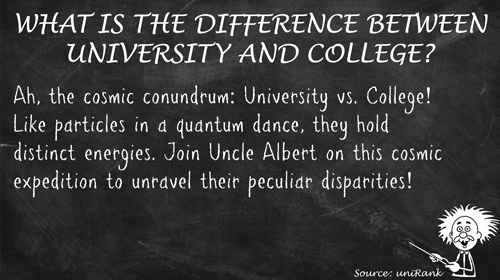
What is the Difference Between University and College?
Published: • Modified:
Introduction
Understanding the difference between a university and a college is important for students and parents navigating higher education. While both institutions offer post-secondary education, they differ in structure, program offerings, research focus and campus experience. This article explores these distinctions in detail, along with benefits, challenges and global perspectives.
Definition of College
A college is typically an institution that focuses on undergraduate education, providing diploma, associate, or bachelor's degree programs. Colleges often emphasize teaching over research and provide smaller class sizes, fostering close interaction between students and instructors. In some countries, colleges are part of larger universities.
Definition of University
A university is a higher education institution that offers undergraduate and graduate programs, often including doctoral degrees. Universities have a strong focus on research, innovation and comprehensive education across multiple disciplines. They are generally larger than colleges and offer diverse academic, cultural and extracurricular opportunities.
Main Differences Between University and College
- Program Levels: Colleges primarily offer undergraduate programs; universities offer undergraduate, graduate and doctoral programs.
- Research Focus: Universities emphasize research and innovation, while colleges focus more on teaching and skill development.
- Size and Campus Life: Universities are usually larger, with more departments, students and campus activities; colleges are smaller and more personalized.
- Global Variations: In some countries, "college" may refer to high school-level education or vocational training, while universities provide higher education degrees.
Benefits of Colleges
Colleges offer students a focused learning environment with smaller classes, more personalized instruction and practical skills. They are ideal for students seeking direct career preparation or a close-knit academic community.
Benefits of Universities
Universities provide a broader range of programs and degrees, exposure to cutting-edge research, diverse cultural experiences and global networking opportunities. They prepare students for both academic and professional careers while fostering critical thinking and innovation.
Challenges in Choosing Between College and University
Students may face challenges such as understanding program quality, tuition costs, career outcomes and cultural fit. Both types of institutions offer unique advantages and the best choice depends on individual goals, learning preferences and career aspirations.
In Summary
While colleges and universities both provide post-secondary education, their structure, focus and offerings differ. Colleges are typically smaller, teaching-focused institutions, while universities offer a wide range of programs, research opportunities and global experiences. Understanding these differences helps students make informed decisions about their educational path.
Frequently Asked Questions (FAQs)
What is the main difference between a college and a university?
The main difference is that colleges usually focus on undergraduate education and teaching, while universities offer undergraduate, graduate and doctoral programs with a strong focus on research.
Can a college be part of a university?
Yes, in many countries, colleges can be constituent parts of universities, offering specialized programs within a larger academic institution.
Which is better: college or university?
Neither is universally better; it depends on the student's goals. Colleges are ideal for focused undergraduate education, while universities offer broader academic and research opportunities.
Do all countries use the terms college and university the same way?
No, the terms vary globally. In some countries, colleges provide vocational or high school-level education, while universities are dedicated to higher education and research.
Are colleges smaller than universities?
Generally, yes. Colleges tend to have smaller student populations and campuses, allowing for more personalized attention and closer interaction with instructors.
Do universities focus more on research?
Yes, universities emphasize research alongside teaching, contributing to innovation, scientific discovery and advanced scholarship across disciplines.
Which type of institution is better for career preparation?
Both can prepare students for careers. Colleges offer practical, skills-focused education, while universities provide broader academic knowledge, networking and research experience that can benefit long-term career growth.

